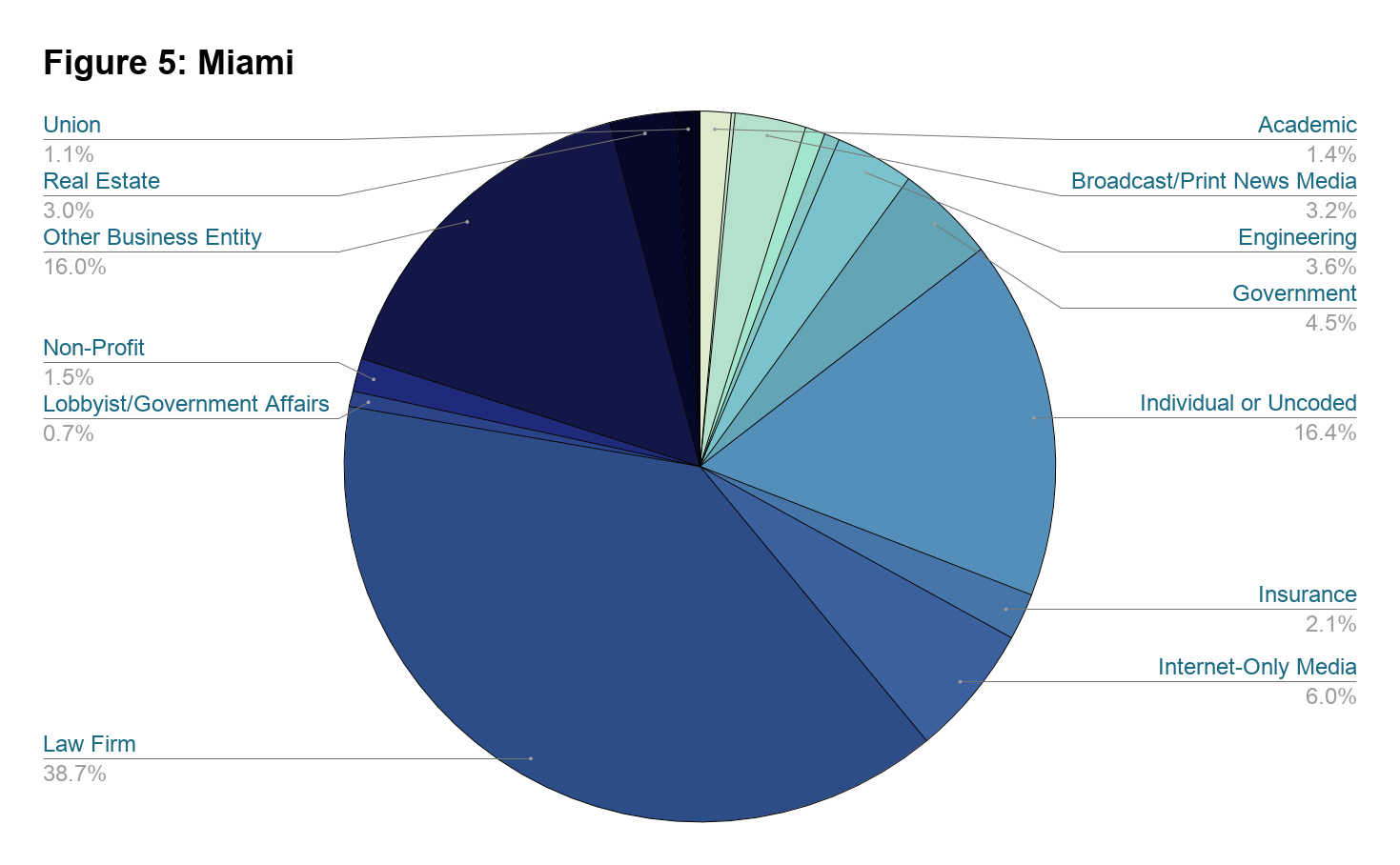Who Benefits from the Public Records Law?
This analysis is a collaboration with the Miami Waterkeeper, an environmentally focused non-profit organization. Check out their work at www.miamiwaterkeeper.org.
A more comprehensive version of this post was published in the N.Y.U. Journal of Legislation & Public Policy.
We conducted a limited study of public records requests across the State of Florida to determine which industries most used the Public Records Act.
In order to accomplish this analysis, we obtained logs of requests for public records made between January 2019 and May 2020 for the following cities in Florida: Cape Coral, Fort Lauderdale, Miami, Orlando, and Tallahassee.
We chose these five cities because: (1) they are among the ten most populous cities in Florida and (2) they use software to track their public records requests, making it possible for us to obtain and review their request logs. It is worth noting that not every local government uses such software.
Figure 1: Comparison of Public Records Requests Across Five Florida Cities
For each log entry, we attempted to categorize the identity of the person or organization making the request. For our purposes, records requesters were placed in one of the following categories:
Academic: includes requesters linked to academic institutions. Whenever possible, we attempted to verify that the request was made for a research purpose.
Architecture Firm: includes businesses primarily providing architectural services like planning and design for building construction.
Broadcast/Print News Media: includes organizations in the field of journalism that primarily distribute content through print newspapers, television, or radio stations.
Condominium Association/Neighborhood Association/Homeowners Association: includes any organized group of residents or property owners related to a specific, geographic community.
Construction Industry: includes businesses primarily providing labor and expertise to erect buildings, roads, and other infrastructure.
Engineering Industry: includes businesses primarily providing engineering services across a variety of more specialized fields.
Government: includes government agencies of all sizes.
Individual or Uncoded: refers to requests made by individuals unaffiliated with another organization or business as well as instances where we were unable to verify the requester’s affiliation or where the requester was anonymous.
Insurance Company: refers to a business primarily providing insurance policies.
Internet-Only Media: includes bloggers and media outlets, whether journalistic or not, that primarily distribute content online.
Law Firm: includes any attorney or paralegal in private practice.
Lobbyist/Government Affairs: refers to professionals, whether employed at an independent firm or by a larger company, who primarily provide services aimed at influencing government policy. These requesters were not compared against lobbyist registrations, only company websites and job descriptions.
Non-Profit Organization: includes tax-exempt organizations whether affiliated with religious, political, educational, or other social causes.
Other Business Entity: includes any for-profit entity not covered by one of the other categories.
Real Estate Industry: includes realtors and real estate developers.
Union: includes any association of workers forming a legally recognized bargaining unit.
This analysis only included cities in Florida and no other local governments like counties, special districts, or state agencies. Nevertheless, it covers thousands of records requests for each jurisdiction.
Each log entry represented an individual request for public records, meaning that one person or entity could appear in the log multiple times. Accordingly, our results do not mean that most requesters fall into a specific category, but that most requests are made by individuals or organizations in those categories.
As another disclaimer, the records request logs included in this analysis omit requests made directly to the cities of Miami’s and Tallahassee’s police departments, as we did not have access to those documents. Likewise, the quality of data provided by each jurisdiction was not the same. In some cases, we were able to access the text of the request, in others, only the date of the request and name of the requester. Hence, the varying level of detail we received for each request affected our ability to apply a category in some instances. Where there was not enough information to make a determination, the label “Individual or Uncoded” was applied. Additionally, the data for this analysis was processed by a research team. While data was reconciled and reviewed, a certain degree of individual bias is likely present in the coding of the records requests. Finally, the last few months of requests included in the logs took place during the COVID-19 pandemic. The pandemic’s effect on public records requests, if any, is unclear.
What is clear, however, is that diverse groups of professionals and individuals find value in accessing public records. In Cape Coral, for example, a single pool contractor made over 1,000 public records requests over the course of a year. The takeaway is that the Public Records Act can be a powerful tool for anyone looking to use it.
To learn more about Florida’s Public Records Act, check out CivicPro’s explainer here.
To keep up with the latest decisions by your local government, click the button below to sign up for free, personalized alerts from CivicPro.
Note that information in Figure 2, above, is an average of the results for each category across the five Florida cities listed above. The mean rates of records requests per category are presented to illustrate how frequently certain community segments seek government documents. The averages in this figure are not weighted by municipal population size nor are they intended to predict specific outcomes. The information in this blog/web site is made available for educational purposes only as well as to give you general information and a general understanding, not to provide specific legal advice (or any legal advice). By using this site you understand that there is no attorney client relationship between you and the blog/web site publisher. The blog/web site should not be used as a substitute for competent legal advice from a licensed professional attorney in your state or jurisdiction.








